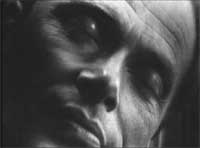|
Trained as a theatre director and dramaturge in Norway and the UK. Lived and worked as a writer, actor and university lecturer in London from 1971-78. Artistic Director at Norway's oldest theatre, Den Nationale Scene in Bergen, for ten years from 1986, during which a strong field of contemporary Norwegian playwrights were introduced, most notably Jon Fosse. Managing director of the government owned production company Norsk Film AS from 1996-2001, and from 2001 Head of the Producers' Department at the Norwegian Academy of Film, and partner in the film, TV and stage production company Dinamo Story AS. Apart from some 150 productions for the stage, he has produced or co-produced appr. 20 feature films, most notably Insomnia (Erik Skjoldbjærg, 1997), Bloody Angels (Karin Julsrud, 1998), Aberdeen (Hans Petter Moland, 2000), Cool & Crazy (Knut Erik Jensen, 2001), and Music for Weddings and Funerals (Unni Straume, 2002).  How does it happen that you got the role of the male lead in Derailment? What happened, in the manner of auteurs which Unni so palpably and committedly is, she draws upon people that she gets to meet. We got into a collaborative relationship in connection with a funding body of which I was the chair and she was the representative of one of the film organizations. And we got to know one another and found a common ground in terms of likes and dislikes. And at that juncture, since I had done some acting occasionally and partly trained as an actor, when she had this story she - in her mind - put me in the role. And after having done so, in her development of the story and of the screenplay, she then asked me if I would mind doing it. It's an instance of an auteur's process, I think. Do you happen to remember the instructions that Unni gave you during the shoot, as to how she wanted you to play your part? Well put it this way. When she auditioned me for the role, because we did some screen tests, her concern was the ability to project a dreamlike image, if you like… a dreamy vision, which is of course is what it's all about. I'm asleep and some sensory or sensorial touch sets off a trail of fantasies, basically. This is what she was concerned with. That I would be in tune with the images that she had conceived visually for the film. That I was able to project them, and in other words give the cue to employing the subjective images which forms the main body of the film. It was more in the screen-test that she directed me, giving me the images and the situation and then letting the camera roll. 'Cause of course there's no dialogue, there's no action as such. It is an ability to project as observed. Allow the camera to catch whatever was going on. Having tested it, she was sort of happy that that was possible. And we worked on it for quite some time. Having worked as an actor, of course I knew something about it. I knew something about techniques to employ in a situation like that. You could say I gave her what I knew how to do and then she wanted a bit more and adjusted some parts of the sequence and we did the actual shooting three months later. As I remember the shoot itself, she directed mostly the others, the extras, the circumstances, rather than me and the actress. Because she had talked so much about the situation and the idea that she allowed us to do it. So we played off each other. Are there any other things you remember from the shoot after all these years, that you might want to mention? It was a very pleasant experience. I mean, a week in Paris in the summer, shooting a story that very much belonged in Paris in the summer. It was a case of really entering into a world which was also the world that the film was to evoke. It was lovely, and it was a lovely crew and together we enjoyed Paris [laughter]. Derailment is a very unusual short film in the way it tells its story. I was wondering if you could tell me in your own words… if you were to describe this film to someone who had never seen it, how would you describe Derailment? It's a film about the quintessential brief encounter. One touch, in the anonymous vacuum of a crowd, in the anonymously urban setting of a metro... One touch between two people stirring up the deepest desire to become one with another. | ||
| ||
| ||